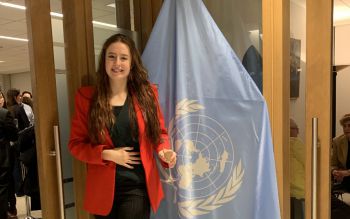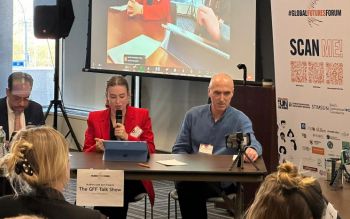View Experience Sussex! articles from previous issues and catch up on anything you’ve missed.
Student Lauren Banham takes her sustainability activism to the United Nations
Posted on behalf of: Student Communications
Last updated: Monday, 20 November 2023

Lauren stood in front of the UN flag

Lauren at the Global Futures Forum
We recently sat down with Lauren Banham, a second-year International Development student. Lauren had just returned from attending the Paris Peace Forum in her role as the Programme Director for Legal Pact for the Future. Read on to hear about Lauren’s work with non-governmental organisations (NGOs) and her hopes for the future.
Looking back, what made you choose Sussex?
During my A levels I did some work around UN 75 (relating to the United Nations’ 75th anniversary) with Sir Richard Jolly, who had been the second Director of the Institute of Development Studies (IDS) in the 1970s. He asked what I was thinking of studying and I said international development. His response was, “So are you going to Sussex?” When the time came to look at options, it was a no brainer.
Last academic year you studied a social justice module with Dr Katherine Kruger. What was your biggest takeaway from this?
The module with Katherine was by far my favourite module to date. It was so good because it gave me a comprehensive academic understanding of social justice theory, but it also offered more practical applications than my other courses. When I did extra reading around case studies, my academic writing became stronger and my confidence in my writing improved.
In a personal sense, it was the module that made me feel more connected with the community at Sussex and in Brighton. We did some work with Citizens UK and campaigned around housing conditions for students.
Katherine’s module also encouraged me to continue my work with NGOs. When I came to Sussex, I thought I might need to step back from the work I do outside of my course, but this module brought both parts back together.
In March 2023 you presented at the Global Futures Forum in New York. How did you find that experience?
It was amazing. The Global Futures Forum was arranged by C4UN (Coalition for the UN We Need) . It brought together a diverse range of civil society representatives to put together a People’s Pact for the Future. This pact will be used to give civil society a voice in the discussions and legislation that come out of the 2024 Summit of the Future, which will determine the UN agenda going forward.
Contributing to this process was massive. I was involved in the environmental governance track and, for me, more than anything it was an opportunity to meet people doing similar work and have proactive conversations on what needs to happen next. This was where Legal Pact for the Future started.
You then organised the Sussex Global Futures Forum in April. What led you to this?
Going into the Global Futures Forum in New York, I knew I would be coming back to Sussex to run a forum here. I started doing this work around four years ago because I wanted there to be a greater level of accessibility around the UN’s work. I felt that a lot of UN decisions were made without consulting the people these issues most affect.
Civil society participation within UN processes is on the rise. However, I felt we could take this a step further using existing institutions, such as universities like Sussex, to find out what everyday people want from multilateral institutions like the UN. I created the March event with other students from the social justice module and with Katherine’s support, to give people that voice at Sussex.
You’ve since continued working on the Legal Pact for the Future campaign and been featured on Hawaiian television talking about it. What do you hope this work will achieve?
Along with Dr Kirk Boyd and Anna Maddrick, I started this campaign because we felt like each track at the Global Futures Forum had an area missing – enforceable rights. How can we use the law to ensure that these rights are being implemented and delivered on? The Sustainable Development Goals (SDGs) hinge on enforceability, but in the conversations we had it felt there wasn’t strong representation for this.
Legal Pact for the Future provides linkages for people, NGOs, businesses and governments. We’re asking for a rebalance of power by strengthening legal systems because people and planet deserve to have enforceable rights. Our first report covers law and development, environmental governance and regional courts, with more work around Artificial Intelligence (AI) and space development likely to come.
Why do you think it’s important for other students to get involved in sustainability initiatives?
A narrative we hear a lot in the media is “It's the young people’s future”, or “It’s on young people to create the future that they want”. This expectation can create a lot of pressure, and we know climate anxiety is on the rise. I like to challenge this narrative as I think it puts too much emphasis on solving a situation we had no role in creating.
I think the way I would turn this narrative around is to take the power back. It's not about young people needing to be the only people in sustainability, but it can feel this way, looking at things like Fridays for Future. There needs to be a diverse range of perspectives. We need to have our views represented, events like the Global Futures Forum, which place a particular focus on intergenerational cooperation, help to do this. Young people have phenomenal ideas and we deserve to have a say.
